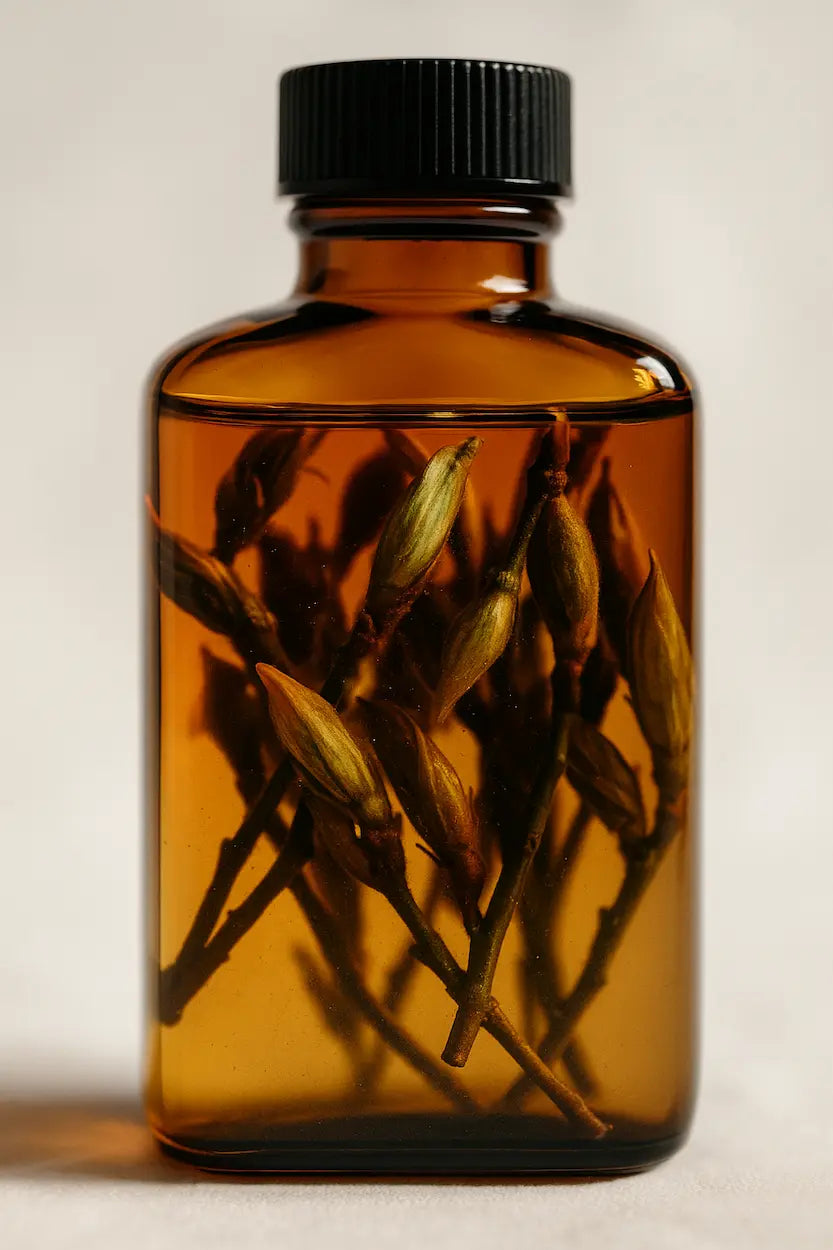
The Wild Ones: Why We Use Whole Plants, Not Lab Copies
Introduction: The Return to What Was Never Broken
In a world of white lab coats and sterile ingredients, we’re stepping back—back into the forest, back into the roots, back into what nature already perfected. At TSORI, we don’t believe in mimicking nature. We believe in revering it.
While many brands turn to lab-synthesized compounds and plant-derived isolates to create so-called "natural skincare products," we return to the whole wild plant. Sticky resin. Fragrant leaf. Sun-warmed seed. Our entire skincare line is built upon this radical simplicity—because nature’s pharmacy was always complete.
This is our why. This is TSORI.
The Whole Plant Philosophy: What It Means and Why It Matters
Whole-plant skincare means we use the complete botanical—rich with hundreds of co-existing compounds—not a lab-isolated fraction of it. That’s the difference between sipping a cup of chamomile tea and swallowing a synthetic compound labeled “apigenin.”
Whole plants are synergistic. Their chemistry is intricate, wild, and wise—compounds that buffer each other, soothe each other, and activate healing in ways science is only beginning to understand.
Lab copies are simplified. They’re stripped down, sterilized, and replicated for shelf stability. But when the plant is fractured, something vital is lost.
That’s why our minimalist skincare—whether a natural skin moisturizer for dry skin or an oil-based cleanser—is always made from whole, organic botanicals. Nothing less.
Chart: Whole-Plant vs Lab-Created Ingredients

This visual comparison lays out the heart of our skincare philosophy. It's not just poetic—it’s measurable. When you place whole-plant ingredients side by side with their lab-created counterparts, the differences are striking. Whole plants consistently outperform in categories that matter most to your skin’s health and long-term vitality.
· Nutrient Retention: Whole plants contain hundreds of naturally co-occurring compounds—vitamins, antioxidants, fatty acids—all working in harmony. Lab-made versions often contain only a single active compound, devoid of the entourage effect.
· Skin Compatibility: Because whole plants mirror the biology your skin evolved with, they tend to be more soothing, less sensitizing, and far better tolerated, especially in natural skin care for sensitive skin.
· Sustainability: Nature, when harvested responsibly, offers a renewable supply of potent botanicals. Lab-synthesized alternatives often rely on petrochemicals and high-energy processes.
· Bioavailability: Your skin recognizes whole-plant compounds and absorbs them more effectively than fragmented, isolated versions.
· Sensory Experience: There’s no comparison. The scent, texture, and feel of whole-plant formulations awaken your senses and offer a grounding, healing experience that synthetic alternatives simply can’t replicate.
This chart isn’t just data—it’s proof that what’s wild and whole is also what’s most effective.
My Personal Journey: From Eczema to Epiphany
I didn’t start this brand to follow trends. I started it to help my daughter’s skin.
After years of trying professional organic skincare and prescribed creams for her eczema, nothing truly worked. Her skin remained inflamed, dry, and reactive. Then, in an act of desperation—and intuition—I turned to the wisdom of wild plants and made a balm using one of the most ancient botanical remedies I could find. It wasn’t sterilized. It wasn’t filtered. It wasn’t altered to fit modern formulas.
And her skin? It healed.
That balm became our first product. That experience became our philosophy. Our entire minimalist skin care line is rooted in that one truth: nature knows best.
What You Lose With Lab-Created Ingredients
Brands that call themselves "natural beauty products" often use lab-synthesized esters, isolated essential oil compounds, or fractionated plant parts. Here's what that means for your skin:
- Reduced nutrient diversity – A lab-created version of calendula might include one flavonoid. A whole calendula flower contains over 100 beneficial compounds.
- Increased risk of irritation – Isolated compounds like linalool or geraniol, when separated from their plant matrix, are more volatile and allergenic.
- Artificial textures – These ingredients are often designed to feel light and non-greasy, but lack the depth and nourishment your skin craves.
- Hidden preservatives – Because lab copies often need synthetic stabilizers, your "natural skin care for sensitive skin" may include invisible toxins.
At TSORI, we chose a different path. A harder one. But a truer one.
The Skin Knows the Difference
Whole-plant oils and extracts speak your skin’s language.
Our bodies matured alongside these plants. That’s why when you apply our clean skin care products, they don’t sit on the surface. They’re welcomed in. They hydrate without heaviness. They calm without numbing.
Whether you need a natural remedy for dry skin on face, or a natural skin moisturizer for dry skin that doubles as a barrier protectant, whole plants perform—because they come with their full, wild instruction manual.
Minimalism, Redefined: Simple Skin Care That’s Anything but Basic
We often hear people say, “I’m looking for a simple skin care routine that actually works.”
But “simple” has been mistaken for “stripped down.” At TSORI, we believe minimalist skin care isn’t about doing less—it’s about doing only what matters.
Every ingredient is doing deep work:
- Meadowfoam Seed Oil for its barrier-restoring properties.
- Blue Tansy for calming redness and inflammation.
- Sea Buckthorn for deep hydration and tissue regeneration.
This is the core of our easy skin care routine—fewer steps, better results, deeper nourishment.
Ingredient Integrity: From Soil to Skin
We partner with organic farmers, wild harvesters, and small cooperatives. We look for oils that are:
- Cold-pressed
- CO2-extracted
- Certified organic
- Freshly harvested
We never use deodorized, bleached, or refined oils. Why? Because when it comes to natural skin care remedies, the magic is in the messiness.
Each drop of our natural personal care products contains the full vitality of the plant. That’s not something you can synthesize.
Why Your Skin Is Dehydrated (Even If You Moisturize)
Most commercial moisturizers—even those calling themselves clean beauty skincare—are over 70% water. That means you’re paying for dilution.
Water-based formulas often require:
- Emulsifiers
- Preservatives
- Stabilizers
These ingredients do little for hydration. In fact, they can contribute to transepidermal water loss (TEWL), making dry skin worse over time.
Our moisturizers for dehydrated skin skip the water entirely. Instead, we use:
- Camellia seed oil: deeply penetrative and featherlight
- Jojoba oil: biomimetic and balancing
- Prickly pear: antioxidant-rich and firming
It’s a richer kind of moisture. A quieter kind of healing.
The Truth About “Natural” Claims
Natural beauty skincare is often anything but.
Many so-called "natural skincare products" still contain:
- Phenoxyethanol
- Synthetic fragrance compounds (labeled as "aroma")
- Lab-modified esters
We invite you to read every label. Compare them to ours. If it doesn’t sound like something you’d find in a garden, it doesn’t belong in our formulas.
TSORI’s Ingredient Pledge
We pledge to use only:
- Whole, wild, or organically grown plants
- No esters, isolates, or synthetic derivatives
- No “greenwashed” emulsifiers or disguised preservatives
That’s what we mean by organic professional skin care—not just a claim, but a code of conduct.
Common “Natural” Ingredients We Don’t Use
|
INGREDIENT |
WHY WE DON’T USE IT |
|
POLYGLYCERYL-4 OLEATE |
Lab-synthesized emulsifier, not truly plant-based |
|
PHENOXYETHANOL |
Synthetic preservative, irritating to sensitive skin |
|
FRAGRANCE (PARFUM) |
May include hundreds of undisclosed chemicals |
|
CAPRYLIC/CAPRIC TRIGLYCERIDE |
Fractionated, deodorized oil derivative |
|
SQUALANE (FROM SUGARCANE) |
Highly processed, lacks full-spectrum plant benefit |
The above table shows common "natural" ingredients used in skincare and reasons why TSORI excludes them from its formulations.
A Better Standard for Beauty
When you hold a TSORI bottle, you're not holding a chemical cocktail in disguise. You're holding something primal. Something sacred.
That’s not marketing. That’s whole-plant medicine doing what it was always meant to do.
The Takeaway: Nature Already Made It Perfect
When you choose TSORI, you're not just choosing natural personal care products—you're choosing a philosophy, a return, a reclamation. You’re saying yes to unfiltered botanicals, to ancestral wisdom, to skincare that honors the rhythms of the earth.
Because the wild ones—plants in their whole, unedited form—already know how to heal. They’ve been tending wounds, softening skin, and restoring balance long before the first lab coat ever touched a beaker.
There’s no need to reinvent nature. There’s only the invitation to remember it.
We don’t tame these plants—we preserve their wildness. We don’t dissect them—we honor their wholeness. In a world of synthetic shortcuts, TSORI is a quiet rebellion.
We just bottle their wisdom.
Welcome to the wilder way.
